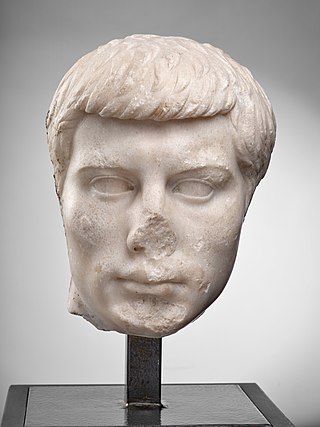Related Research Articles

Tiberius Julius Caesar Augustus was a Roman emperor. He reigned from AD 14 until 37, succeeding his stepfather, the first Roman emperor Augustus. Tiberius was born in Rome in 42 BC. His father was the politician Tiberius Claudius Nero and his mother was Livia Drusilla, who would eventually divorce his father, and marry the future-emperor Augustus in 38 BC. Following the untimely deaths of Augustus' two grandsons and adopted heirs, Gaius and Lucius Caesar, Tiberius was designated Augustus' successor. Prior to this, Tiberius had proved himself an able diplomat, and one of the most successful Roman generals: his conquests of Pannonia, Dalmatia, Raetia, and (temporarily) parts of Germania laid the foundations for the empire's northern frontier.

Lucius Aelius Sejanus, commonly known as Sejanus, was a Roman soldier, friend, and confidant of the Roman Emperor Tiberius. Of the Equites class by birth, Sejanus rose to power as prefect of the Praetorian Guard, of which he was commander from AD 14 until his execution for treason in AD 31.

The gens Furia, originally written Fusia, and sometimes found as Fouria on coins, was one of the most ancient and noble patrician houses at Rome. Its members held the highest offices of the state throughout the period of the Roman Republic. The first of the Furii to attain the consulship was Sextus Furius in 488 BC.

The gens Julia was one of the most prominent patrician families in ancient Rome. Members of the gens attained the highest dignities of the state in the earliest times of the Republic. The first of the family to obtain the consulship was Gaius Julius Iulus in 489 BC. The gens is perhaps best known, however, for Gaius Julius Caesar, the dictator and grand uncle of the emperor Augustus, through whom the name was passed to the so-called Julio-Claudian dynasty of the first century AD. The nomen Julius became very common in imperial times, as the descendants of persons enrolled as citizens under the early emperors began to make their mark in history.

Tiberius Julius Caesar Nero, known as Tiberius Gemellus, was the son of Drusus and Livilla, the grandson of the Emperor Tiberius, and the cousin of the Emperor Caligula. Gemellus is a nickname meaning "the twin". His twin brother, Germanicus Gemellus, died as a young child in AD 23. His father and older cousins died, and are suspected by contemporary sources as having been systematically eliminated by the powerful praetorian prefect Sejanus. Their removal allowed Gemellus and Caligula to be named joint-heirs by Tiberius in 35, a decision that ultimately resulted in Caligula assuming power and having Gemellus killed in late 37 or early 38.

Gnaeus Domitius Ahenobarbus was a member of the imperial Julio-Claudian dynasty of Ancient Rome. Domitius was the son of Antonia Major. He married Agrippina the Younger and became the father of the emperor Nero.
Gaius Sallustius Passienus Crispus was a prominent figure in the Roman Empire during the first century. He held the consulship twice, and was stepfather of the future emperor Nero.
The gens Scribonia was a plebeian family of ancient Rome. Members of this gens first appear in history at the time of the Second Punic War, but the first of the Scribonii to obtain the consulship was Gaius Scribonius Curio in 76 BC.
Appius Junius Silanus, whom Cassius Dio calls Gaius Appius Silanus, was consul in AD 28, with Publius Silius Nerva as his colleague. He was accused of majestas, or treason, in AD 32 along with a number of senators, but he and Gaius Calvisius Sabinus were saved by one of the informers, Celsus, a tribune of a city cohort.

FuriaLivia Medullina Camilla was the second fiancee of the future Emperor Claudius.
Quintus Pomponius Secundus was a Roman aristocrat of the first century, and consul suffectus in AD 41 as the colleague of Gnaeus Sentius Saturninus. His brother was the poet and statesman Publius Pomponius Secundus, and their half-sister, Milonia Caesonia, was the second wife of the emperor Caligula.
Marcus Furius Camillus was a Roman senator and a close friend of the emperor Tiberius. Despite being without previous military experience, he enjoyed several successes against the Numidian rebel Tacfarinas while serving as governor of Africa, and was even praised in public by the Emperor and awarded triumphal honours. The historian Tacitus, in his Annales, joked that Camillus subsequently lived invisibly enough to survive this great honour.
The gens Vitellia was a family of ancient Rome, which rose from obscurity in imperial times, and briefly held the Empire itself in AD 69. The first of this gens to obtain the consulship was Aulus Vitellius, uncle of the emperor Vitellius, in AD 32.

The gens Vibia was a plebeian family at ancient Rome. Although individuals named Vibius appear in history during the time of the Second Punic War, no members of this gens are found at Rome until the final century of the Republic. The first of the Vibii to obtain the consulship was Gaius Vibius Pansa in 43 BC, and from then until imperial times the Vibii regularly filled the highest offices of the Roman state. The emperors Trebonianus Gallus and Volusianus each claimed descent from the family.
The gens Arruntia was a plebeian family at ancient Rome. Members of this gens first came to prominence during the final years of the Republic.
Lucius Arruntius was a Roman senator praised by the ancient Roman historian Tacitus. He lived throughout most of the reigns of the two first Roman emperors, Augustus and Tiberius. In 6 AD he was appointed consul, and then governor of Hispania Tarraconensis around 25 AD, which he governed in absentia for over 10 years. Throughout the latter part of his life he was plagued by hostility from the Praetorian Guard prefects, Sejanus and Macro, which culminated in his suicide in 37 AD after being arraigned on a trumped-up charge of irreverence to the then-emperor Tiberius.
The gens Domitia was a plebeian family at ancient Rome. The first of the gens to achieve prominence was Gnaeus Domitius Calvinus, consul in 332 BC. His son, Gnaeus Domitius Calvinus Maximus, was consul in 283, and the first plebeian censor. The family produced several distinguished generals, and towards the end of the Republic, the Domitii were looked upon as one of the most illustrious gentes.
Lucius Annius Vinicianus was a Roman senator during the Principate. He is best known for his involvement in the assassination of Caligula and a rebellion against Claudius.

The gens Sanquinia was a minor plebeian family at ancient Rome, which rose out of obscurity in imperial times to attain the highest offices of the Roman state. Members of this gens are first mentioned in the time of Augustus, and Quintus Sanquinius Maximus held the consulship under Tiberius and Caligula. The family vanishes from history in the time of Claudius.
The gens Seia was a minor plebeian family of equestrian rank at ancient Rome. Members of this gens are first mentioned in the time of Cicero, and a few of them held various magistracies under the late Republic and into imperial times.
References
- ↑ Cooley, Cambridge Manual of Latin Epigraphy, p. 460
- ↑ Dictionary of Greek and Roman Biography and Mythology, vol. I, p. 592 ("Marcus Furius Camillus", No. 6).
- 1 2 3 PIR, vol. I, p. 145.
- ↑ Suetonius, "The Life of Claudius", 26.
- ↑ Tacitus, Annales, ii. 52.
- ↑ Dictionary of Greek and Roman Biography and Mythology, vol. I, p. 592 ("Furius Camillus", No. 7).
- 1 2 PIR, vol. I, pp. 146, 147.
- ↑ Tacitus, Annales, vi. 1.
- ↑ Cassius Dio, lviii. 17.
- ↑ Tacitus, Annales, vi. 2–14.
- ↑ Cassius Dio, lviii. 17–20.
- ↑ Fasti Ostienses , CIL XIV, 244.
- ↑ Tacitus, Annales, vi. 5, 7.
- ↑ Tacitus, Annales, vi. 47, 48.
- 1 2 3 4 5 6 Cassius Dio, lx. 15.
- ↑ Suetonius, "The Life of Claudius", 10.
- ↑ Suetonius, "The Life of Claudius", 35, 36.
- 1 2 Suetonius, "The Life of Claudius", 13.
- ↑ Tacitus, Historiae, i. 89.
- ↑ Tacitus, Annales, xii. 52, Historiae, ii. 75.